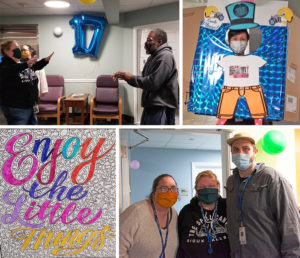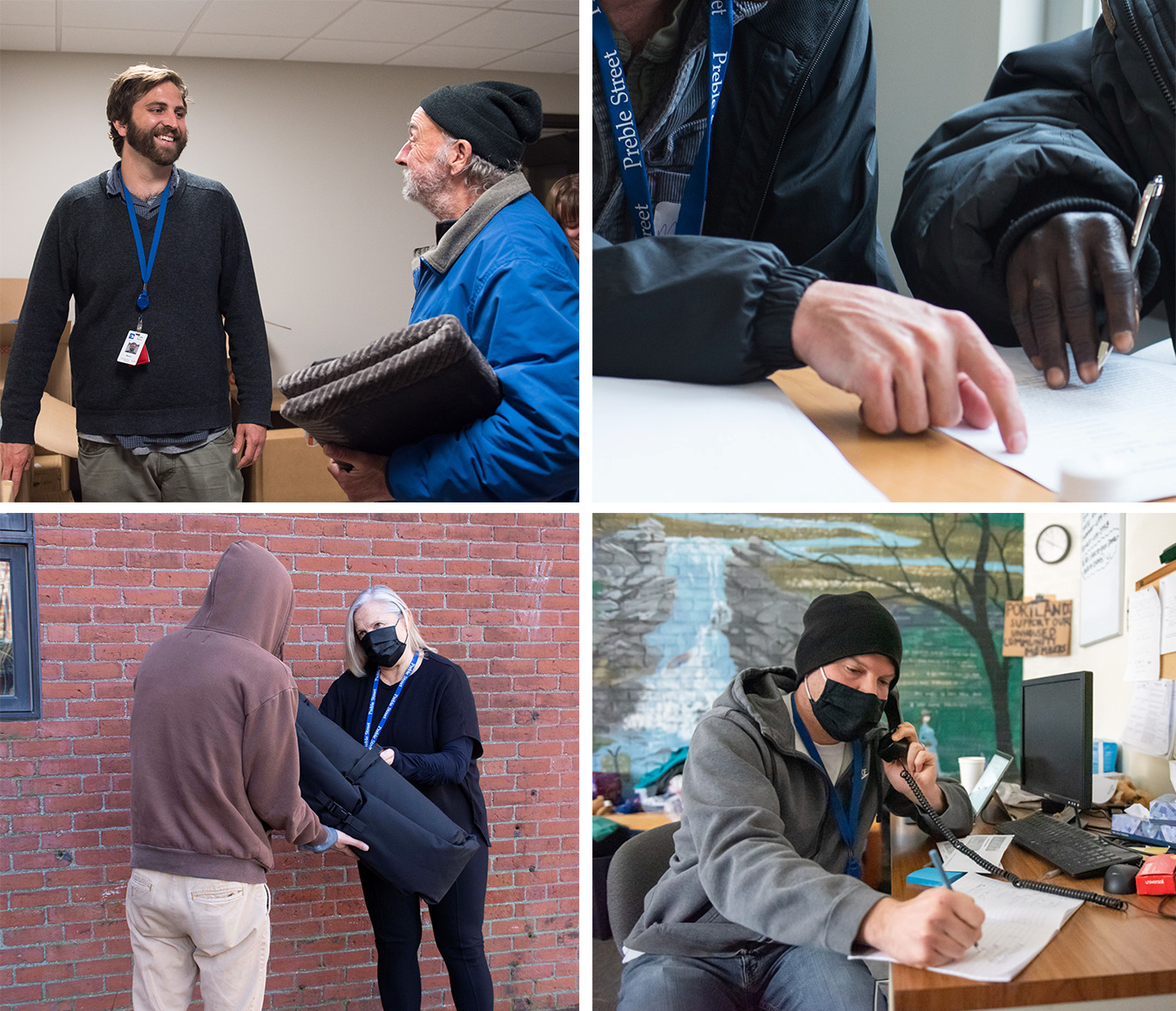“In my time working here, I’ve been able to provide people with many things. I’ve given people vouchers, I’ve helped people move into apartments, I’ve helped somebody repair their vehicle. I’ve provided all of these material things. But time and time again, when people talk to me about what was most important to them, it’s been the fact that I listened to them, I looked them in the eye, I knew their name, and I was willing to listen to their story."
Andrew Bove (he/him), Preble Street Vice President of Social Work
For the past two years, social workers have been on the frontline of the pandemic providing critical care and services to the most vulnerable members of our community. At Preble Street, they are working to empower people experiencing homelessness, hunger, and poverty while demanding systemic change to address the injustices they witness every day. They work alongside clients, helping them navigate difficult systems to reach the goals they lay out for themselves whether that be housing, recovery, employment, signing up for food stamps, or expanding their support system or social circle.
“I don't see my role as doing things for people. We are a team and we have to be working together. What that partnership looks like is individualized depending on the person. We’re often working with people who have a history of having power and choice taken away from them. It is important to make sure that people are getting that agency back in their lives.”
Tori Clarke (she/her), Preble Street Caseworker
Preble Street has been grounded in social work since it opened its doors in 1975. Founder, Joe Kreisler, started the agency as a real-world training ground for his students at the University of Southern Maine School of Social Work (which celebrates its 50th Anniversary this year) and as a place for people to connect to housing, legal assistance, food, and more. Since then, the agency has trained over 500 social work interns from area colleges and universities, some of whom stay on as full-time employees after their internship and others who move on to other human services agencies.
Social workers are guided by a Code of Ethics set out by the National Association of Social Workers (NASW). These ethics provide the foundation for every Preble Street program. From Anti-Trafficking Services to Housing First programs, from Street Outreach to temporary shelters, caseworkers approach every client with unconditional positive regard, empathy, and authenticity. Too often, individuals go through their day seen only through the narrow lens of what they are experiencing — homelessness, hunger, substance use disorder, trauma. Here at Preble Street, the lens widens, and we see the whole person. They are sons, mothers, artists, engineers and have identities that go far beyond their current situation.
Caseworkers have the privilege of getting to see people up close — of seeing so much beauty and hope. “There are days where it is heartbreakingly sad, there are other days filled with joy; there are mornings that are chaotic, there are weekends where it is peaceful; there are times where folks feel hopeless or lonely, there are times when you can feel love and connection radiating through the building,” says Sara Cyr-Jordan (she/her), Preble Street Director of Logan Place. “Consistently showing up for tenants through pandemics, snowstorms, and holidays, day after day, night after night, is our social work team. And they are there for each other too.”

Homelessness, poverty, substance use disorder, and other challenges people face can be extremely isolating. Many of the individuals who come through our programs have become disconnected from family and friends. A key piece of successful social work is building a trusting relationship with the people you’re working with. “As humans, we want to be relevant to someone. Sometimes knowing that there’s someone in your corner is enough to keep you going, enough to give you hope, and hope is everything,” shared Brian Pierre (he/him), a caseworker at Preble Street Veterans Housing Services. Part of his role is checking in with each of his clients at least once a week to ensure they have what they need and to see how he can help. “We’re all doing this work because we truly care. I check in with my clients the same way I would want my friends or family members to check in with me if they haven’t heard from me in a while.”
As clients work to heal, reclaim their lives, and work toward their goals, it is rarely a linear path. Part of social work is being there every step of the way, whether those steps are moving forward, backward, or somewhere in between. When a client finds themselves back at square one, Preble Street caseworkers go right back to square one with them, without judgment.
This work is never done in isolation. “I wish people knew about the collaboration and communication that happens within and across social service agencies,” said Bob Avery (he/him), a caseworker with the Preble Street Street Outreach Collaborative. “We are continuously making connections with other social workers and agencies to better serve our clients and the needs of the community.”
And sometimes, because of broken systems and a lack of resources, the only thing social workers can do is be there. “A big part of my role is just to sit with people while they are suffering. Because a lot of times people have problems that don’t have an easy solution,” adds Tori. “Just being with people in their pain is the best thing that I can offer sometimes, and it is really powerful. And it is also really challenging.”
Social workers have been some of the biggest change advocates in our country’s history because of their firsthand knowledge of the pain and challenges people face. When you spend your days struggling to find affordable housing, recovery programs, or healthcare for individuals in dire need of these resources, it sparks a fire and ignites action. It is why social work agencies like Preble Street play a key role in advocating to change the systems that perpetuate racial, social, and economic injustices in our society.
Social workers approach every individual with respect and dignity. They empower people to lay a new foundation for a better future. They offer hope and in return, they get the opportunity to meet and learn from many incredible human beings. March is National Social Work Month, and we encourage you to learn more about this valuable profession and the many social workers contributing to improving lives in our communities.
